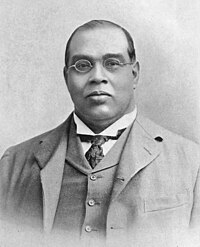Romesh Chunder Dutt
| Romesh Chunder Dutt | |
|---|---|

Romesh Chunder Dutt
|
|
| Born |
13 August 1848 Kolkata, Bengal, British India |
| Died | 30 November 1909 (aged 61) Baroda State, British India |
| Nationality | Indian |
| Occupation | Historian, economist, linguist, civil servant, politician |
| Spouse(s) | Manomohini Dutt (née Bose) |
Romesh Chunder Dutt, CIE (Bengali: রমেশচন্দ্র দত্ত) (August 13, 1848 – November 30, 1909) was an Indian civil servant, economic historian, writer, and translator of Ramayana and Mahabharata.
Dutt was born into a distinguished Bengali Kayastha family well known for its members' literary and academic achievements. His parents were Thakamani and Isam Chunder Dutt. His father, Isam Dutt, was a Deputy Collector of Bengal, whom Romesh often accompanied on official duties. Romesh was educated in various Bengali District schools, then at Hare School, Calcutta, founded by the philanthropist, David Hare. After his father's untimely death in a boat accident in eastern Bengal, Romesh's uncle, Shoshee Chunder Dutt, an accomplished writer, became his guardian in 1861. Romesh wrote about his uncle, "He used to sit at night with us and our favorite study used to be pieces from the works of the English poets." He was a relative of Toru Dutt, one of nineteenth century Bengal's most prominent poets.
He entered the University of Calcutta, Presidency College in 1864, then passed the First Arts examination in 1866, second in order of merit, and won a scholarship. While still a student in the B.A. class, without his family's permission, he and two friends, Behari Lal Gupta and Surendranath Banerjee, left for England in 1868. Only one other Indian, Satyendra Nath Tagore, had ever before qualified for the Indian Civil Service. Romesh aimed to emulate Satyendranath Tagore's feat. For a long time, before and after 1853, the year the ICS examination was introduced in England, only British officers were appointed to covenanted posts. The 1860s saw the first attempts, largely successful, on the part of the Indians, and especially members of the Bengali intelligentsia, to occupy the superior official posts in India, until then completely dominated by the British.
...
Wikipedia
